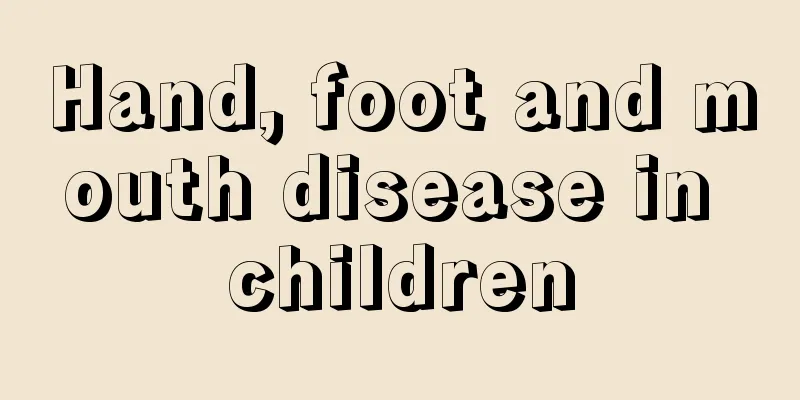Why does my baby walk late and talk late?

|
Everyone knows that babies nowadays can generally speak when they are about 10 months old. Although they can only know a few simple words, it is considered a gradual improvement. However, there are indeed some children who still cannot speak when they are one or two years old. This makes some parents very worried. Of course, to treat a disease, it is necessary to understand its cause. So let's take a look at why babies walk and talk late. When it comes to walking, each child's situation is different. Some children have good physical development, receive early exercise and training, and can walk independently at 9 to 10 months old. Some children are born prematurely, have low weight, are poorly developed, or even suffer from rickets or other diseases, and walk slowly. Others walk slowly due to over-protection, lack of exercise, or wearing too many clothes in winter, being obese, and having difficulty moving. Generally speaking, learning to walk before 16 months is considered normal. 1. Reasons why children speak late The reason why children speak late is because they cannot hear the sounds around them. Babies do not have the physiological conditions to learn pronunciation, so it is impossible for them to understand the meaning of specific sounds and therefore they cannot communicate using language. If a baby's hearing is abnormal, it will have a serious impact on the development of the baby's intelligence and emotional abilities. Babies with intellectual disabilities also have poorer language development than their peers. In addition to confirming that the baby's hearing is completely normal, it is necessary to further check whether the baby's pronunciation organs are normal to determine whether special pronunciation and speaking training is needed. 2. The impact of children's late speech The language development process of a child is that he or she can generally hear external sounds and respond to the sounds when he or she is born or in the late pregnancy. From birth, he or she will have a clearer response to the conscious exchanges or language of his or her caregivers. Within one month, he or she can make some glottal sounds, and then slowly develop simple consonants and vowels. By around eight months, he or she can make lip sounds very well, such as "dad", "mom", "da da", etc. At around one year old, he or she will consciously call dad and mom. Between ten months and one year and two months, he or she will have more spoken sentences, but adults cannot understand them, and he or she will often talk to himself or herself. At around one and a half years old, the amount of language begins to increase significantly. At around two years old, three hundred words can appear, and at around two and a half years old, he or she can clearly express his or her wishes. However, language development varies from individual to individual, and each baby develops at his or her own rate. As long as the baby is healthy, it is only a matter of time before he or she starts speaking. This has nothing to do with whether the baby is smart or not. Those who speak early may become scientists, and those who speak late may also become late bloomers. "Parents should not be too anxious, as long as they are guided correctly." 3. How to change your child's late speech Create a good language environment for your baby. Babies learn language by feeling. Parents' expressions, actions, and voices can help them understand the meaning. The more language communication there is between parents and their baby, the stronger the baby's language ability will be. It’s an accumulation process for babies to learn language, so even if parents say a lot, they may not be able to respond in time. But parents should not give up. One day, you will find that all your efforts are not in vain. Encourage your baby to play with older children. When playing with older children, the baby's enthusiasm for learning language will be effectively stimulated in the game, which plays an inestimable role in promoting the development of the baby's language expression ability. 4. Beware of children who speak late Parents should not use any treatment methods on their children indiscriminately. They should take their children to a professional hospital for a detailed examination to find out the cause of their children's delayed language development. The doctor can then determine the best treatment plan and take targeted treatment. The key to improving language delay lies in early detection, early education and early treatment. The above is an introduction to why babies walk and talk late. Because each child’s situation is different, there will be differences of varying sizes. However, if the child really starts speaking very late, parents need to worry more and must take the child to the hospital for examination to determine if there is a language problem so that timely response can be given. |
<<: How many months at most will a baby walk?
>>: What should I do if my baby wants to speak but can't?
Recommend
What happens if a baby is allergic to egg yolk?
Many parents like to add complementary foods to t...
Why do children like to suck their fingers?
Many parents find that their children like to suc...
Neonatal gastric tube insertion
Inserting a gastric tube into a newborn is actual...
Why do babies like to bite their lower lips?
We adults all know that a baby bites his or her l...
What kind of exercise can help children grow taller?
If you want a person to grow taller, then exercis...
When is the best time to have hernia surgery in children?
Hernias are a common problem in children, especia...
Newborn baby is sleepy and can't be woken up
Newborn babies' organs are not fully develope...
Why is my 7 month old baby retching?
Sometimes we may feel suddenly nauseous, and if w...
Children often do these to prevent myopia
Myopia among children is a very common phenomenon...
What are the disadvantages of children eating ice cream?
Ice cream is a delicious snack that is very popul...
What to do if your 10-month-old baby has a low-grade fever
A ten-month-old baby is not yet one year old, so ...
What are the prevention methods for hernia in children?
Nowadays, children are the treasures of every hou...
What are the effects and contraindications of moxibustion for children?
Moxibustion is a therapeutic health care activity...
Height and weight chart of six-year-old boy
Children are the apple of their parents' eyes...
How to tie children's hair beautifully
Mothers always want to dress their daughters more...









